- Home
- Clive Barker
Books of Blood Vol 2 Page 15
Books of Blood Vol 2 Read online
Page 15
Davidson was suddenly scared. He began to slow the car.
"Get on with it, boy." Eugene jabbed the rifle into his crotch again. "We've got them cornered. We've got a whole nest of them here. The boy's leading us right to them."
The cars were all on the slope now, following the leader, their wheels slipping in the sand.
Aaron turned. Behind him, illuminated only by the phosphorescence of their own matter, the demons stood; a mass of impossible geometries. All the attributes of Lucifer were spread among the bodies of the fathers. The extraordinary anatomies, the dreaming spires of heads, the scales, the skirts, the claws, the clippers.
Eugene brought the convoy to a halt, got out of the car and began to walk towards Aaron.
"Thank you boy," he said. "Come here — we'll look after you now. We've got them. You're safe."
Aaron stared at his father, uncomprehending.
The army was disgorging from the cars behind Eugene, readying their weapons. A bazooka was being hurriedly assembled; a cocking of rifles, a weighing-up of grenades.
"Come to Papa, boy," Eugene coaxed.
Aaron didn't move, so Eugene followed him a few yards deeper into the ground. Davidson was out of the car now, shaking from head to foot.
"Maybe you should put down the rifle. Maybe he's scared," he suggested.
Eugene grunted, and let the muzzle of the rifle drop a few inches.
"You're safe," said Davidson. "It's all right."
"Walk towards us, boy. Slowly."
Aaron's face began to flush. Even in the deceptive light of the headlamps it was clearly changing colour. His cheeks were blowing up like balloons, and the skin on his forehead was wriggling as though his flesh was full of maggots. His head seemed to liquefy, to become a soup of shapes, shifting and blossoming like a cloud, the façade of boyhood broken as the father inside the son showed its vast and unimaginable face.
Even as Aaron became his father's son, the slope began to soften. Davidson felt it first: a slight shift in the texture of the sand, as though an order had passed through it, subtle but all-pervasive.
Eugene could only gape as Aaron's transformation continued, his entire body now overtaken by the tremors of change. His belly had become distended and a harvest of cones budded from it, which even now flowered into dozens of coiled legs; the change was marvellous in its complexity, as out of the cradle of the boy's substance came new glories.
Without warning Eugene raised his rifle and fired at his son.
The bullet struck the boy-demon in the middle of his face. Aaron fell back, his transformation still taking its course even as his blood, a stream part scarlet, part silver, ran from his wound into the liquefying earth.
The geometries in the darkness moved out of hiding to help the child. The intricacy of their forms was simplified in the glare of the headlamps but they seemed, even as they appeared, to be changing again: bodies becoming thin in their grief, a whine of mourning like a solid wall of sound from their hearts.
Eugene raised his rifle a second time, whooping at his victory. He had them... My God, he had them. Dirty, stinking, faceless flickers.
But the mud beneath his feet was like warm treacle as it rose around his shins, and when he fired he lost balance. He yelled for assistance, but Davidson was already staggering back up the slope out of the gully fighting a losing battle against the rising mire. The rest of the army were similarly trapped, as the desert liquefied beneath them, and glutinous mud began to creep up the slope.
The demons had gone: retreated into the dark, their lament sunk away.
Eugene, flat on his back in the sinking sand, fired off two useless, vehement shots into the darkness beyond Aaron's corpse. He was kicking like a hog with its throat cut, and with every kick his body sunk deeper. As his face disappeared beneath the mud, he just glimpsed Lucy, standing at the edge of the slope, staring down towards Aaron's body. Then the mire covered his face, and blotted him out.
The desert was upon them with lightning speed.
One or two of the cars were already entirely submerged, and the tide of sand climbing the slope was relentlessly catching up with the escapees. Feeble cries for assistance ended with choking silences as mouths were filled with desert; somebody was shooting at the ground in an hysterical attempt to dam the flow, but it reached up swiftly to snatch every last one of them. Even Eleanor Kooker wasn't to be let free: she struggled, cursing and pressing the thrashing body of a cop deeper into the sand in her frantic attempts to step out of the gully.
There were universal howls now, as panicking men groped and grasped at each other for support, desperately trying to keep their heads afloat in the sea of sand.
Davidson was buried up to his waist. The ground that eddied about his lower half was hot and curiously inviting. The intimacy of its pressure had given him an erection. A few yards behind him a cop was screaming blue murder as the desert ate him up. Further still from him he could see a face peering out from the seething ground like a living mask thrown on the earth. There was an arm close by, still waving, as it sank; a pair of fat buttocks was poking up from the silt sea like two watermelons, a policeman's farewell.
Lucy took one step backwards as the mud slightly overran the lip of the gully, but it didn't reach her feet. Nor, curiously, did it dissipate itself, as a water-wave might have done.
Like concrete, it hardened, fixing its living trophies like flies in amber. From the lips of every face that still took air came a fresh cry of terror, as they felt the desert floor stiffen around their struggling limbs.
Davidson saw Eleanor Kooker, buried to breast-level. Tears were pouring down her cheeks; she was sobbing like a little girl. He scarcely thought of himself. Of the East, of Barbara, of the children, he thought not at all.
The men whose faces were buried but whose limbs, or parts of bodies, still broke surface, were dead of asphyxiation by now. Only Eleanor Kooker, Davidson and two other men survived. One was locked in the earth up to his chin, Eleanor was buried so that her breasts sat on the ground, her arms were free to beat uselessly at the ground that held her fast. Davidson himself was held from his hips down. And most horribly, one pathetic victim was seen only by his nose and mouth. His head was tipped back into the ground, blinded by rock. Still he breathed, still he screamed.
Eleanor Kooker was scrabbling at the ground with torn nails, but this was not loose sand. It was immovable.
"Get help," she demanded of Lucy, hands bleeding.
The two women stared at each other.
"Jesus God!" screamed the Mouth.
The Head was silent: by his glazed look it was apparent that he'd lost his mind.
"Please help us..." pleaded Davidson's Torso. "Fetch help."
Lucy nodded.
"Go!" demanded Eleanor Kooker. "Go!"
Numbly, Lucy obeyed. Already there was a glimmer of dawn in the east. The air would soon be blistering. In Welcome, three hours walk away, she would find only old men, hysterical women and children. She would have to summon help from perhaps fifty miles distance. Even assuming she found her way back. Even assuming she didn't collapse exhausted to the sand and die.
It would be noon before she could fetch help to the woman, to the Torso, to the Head, to the Mouth. By that time the wilderness would have had the best of them. The sun would have boiled their brain-pans dry, snakes would have nested in their hair, the buzzards would have hooked out their helpless eyes.
She glanced round once more at their trivial forms, dwarfed by the bloody sweep of the dawn sky. Little dots and commas of human pain on a blank sheet of sand; she didn't care to think of the pen that wrote them there. That was for tomorrow.
After a while, she began to run.
NEW MURDER IN THE RUE MORGUE
WINTER, LEWIS DECIDED, was no season for old men. The snow that lay five inches thick on the streets of Paris froze him to the marrow. What had been a joy to him as a child was now a curse. He hated it with all his heart; hated the snowballing children (sque
als, howls, tears); hated, too, the young lovers, eager to be caught in a flurry together (squeals, kisses, tears). It was uncomfortable and tiresome, and he wished he was in Fort Lauderdale, where the sun would be shining.
But Catherine's telegram, though not explicit, had been urgent, and the ties of friendship between them had been unbroken for the best part of fifty years. He was here for her, and for her brother Phillipe. However thin his blood felt in this ice land, it was foolish to complain. He'd come at a summons from the past, and he would have come as swiftly, and as willingly, if Paris had been burning.
Besides, it was his mother's city. She'd been born on the Boulevard Diderot, back in a time when the city was untrammelled by free-thinking architects and social engineers. Now every time Lewis returned to Paris he steeled himself for another desecration. It was happening less of late, he'd noticed. The recession in Europe made governments less eager with their bulldozers. But still, year after year, more fine houses found themselves rubble. Whole streets sometimes, gone to ground.
Even the Rue Morgue.
There was, of course, some doubt as to whether that infamous street had ever existed in the first place, but as his years advanced Lewis had seen less and less purpose in distinguishing between fact and fiction. That great divide was for young men, who still had to deal with life. For the old (Lewis was 73), the distinction was academic. What did it matter what was true and what was false, what real and what invented? In his head all of it, the half-lies and the truths, were one continuum of personal history.
Maybe the Rue Morgue had existed, as it had been described in Edgar Allan Poe's immortal story; maybe it was pure invention. Whichever, the notorious street was no longer to be found on a map of Paris.
Perhaps Lewis was a little disappointed not to have found the Rue Morgue. After all, it was part of his heritage. If the stories he had been told as a young boy were correct, the events described in the Murders in the Rue Morgue had been narrated to Poe by Lewis's grandfather. It was his mother's pride that her father had met Poe, while traveling in America. Apparently his grandfather had been a globe-trotter, unhappy unless he visited a new town every week. And in the winter of 1835 he had been in Richmond, Virginia. It was a bitter winter, perhaps not unlike the one Lewis was presently suffering, and one night the grandfather had taken refuge in a bar in Richmond. There, with a blizzard raging outside, he had met a small, dark, melancholy young man called Eddie. He was something of a local celebrity apparently, having written a tale that had won a competition in the Baltimore Saturday Visitor. The tale was MS found in a bottle and the haunted young man was Edgar Allan Poe.
The two had spent the evening together, drinking, and (this is how the story went, anyway) Poe had gently pumped Lewis's grandfather for stories of the bizarre, of the occult and of the morbid. The worldly-wise traveler was glad to oblige, pouring out believe-it-or-not fragments that the writer later turned into The Mystery of Marie Roget and The Murders in the Rue Morgue. In both those stories, peering out from between the atrocities, was the peculiar genius of C. Auguste Dupin.
C. Auguste Dupin. Poe's vision of the perfect detective: calm, rational and brilliantly perceptive. The narratives in which he appeared rapidly became well-known, and through them Dupin became a fictional celebrity, without anyone in America knowing that Dupin was a real person.
He was the brother of Lewis's grandfather. Lewis's great uncle was C. Auguste Dupin.
And his greatest case — the Murders in the Rue Morgue —they too were based on fact. The slaughters that occurred in the story had actually taken place. Two women had indeed been brutally killed in the Rue Morgue. They were, as Poe had written, Madame L'Espanaye and her daughter Mademoiselle Camille L'Espanaye. Both women of good reputation, who lived quiet and unsensational lives. So much more horrible then to find those lives so brutally cut short. The daughter's body had been thrust up the chimney; the body of the mother was discovered in the yard at the back of the house, her throat cut with such savagery that her head was all but sawn off. No apparent motive could be found for the murders, and the mystery further deepened when all the occupants of the house claimed to have heard the voice of the murderer speaking in a different language. The Frenchman was certain the voice had spoken Spanish, the Englishman had heard German, the Dutchman thought it was French. Dupin, in his investigations, noted that none of the witnesses actually spoke the language they claimed to have heard from the lips of the unseen murderer. He concluded that the language was no language at all, but the wordless voice of a wild beast.
An ape in fact, a monstrous orang-outang from the East Indian Islands. Its tawny hairs had been found in the grip of the slain Madame L'Espanaye. Only its strength and agility made the appalling fate of Mademoiselle L'Espanaye plausible. The beast had belonged to a Maltese sailor, had escaped, and run riot in the bloody apartment on the Rue Morgue.
That was the bones of the story.
Whether true or not the tale held a great romantic appeal for Lewis. He liked to think of his great uncle logically pacing his way through the mystery, undistressed by the hysteria and horror around him. He thought of that calm as essentially European; belonging to a lost age in which the light of reason was still valued, and the worst horror that could be conceived of was a beast with a cut-throat razor.
Now, as the twentieth century ground through its last quarter, there were far greater atrocities to be accounted for, all committed by human beings. The humble orang-outang had been investigated by anthropologists and found to be a solitary herbivore; quiet and philosophical. The true monsters were far less apparent, and far more powerful. Their weapons made razors look pitiful; their crimes were vast. In some ways Lewis was almost glad to be old and close to leaving the century to its own devices. Yes, the snow froze his marrow. Yes, to see a young girl with a face of a goddess uselessly stirred his desires. Yes, he felt like an observer now instead of a participator.
But it had not always been that way.
In 1937, in the very room at number eleven, Quai de Bourbon, where he now sat, there had been experience enough. Paris was still a pleasure-dome in those days, studiously ignoring rumours of war, and preserving, though at times the strain told, an air of sweet naïveté. They had been careless then; in both senses of the word, living endless lives of perfect leisure.
It wasn't so of course. The lives had not been perfect, or endless. But for a time — a summer, a month, a day — it had seemed nothing in the world would change.
In half a decade Paris would burn, and its playful guilt, which was true innocence, would be soiled permanently. They had spent many days (and nights) in the apartment Lewis now occupied, wonderful times; when he thought of them his stomach seemed to ache with the loss.
His thoughts turned to more recent events. To his New York exhibition, in which his series of paintings chronicling the damnation of Europe had been a brilliant critical success. At the age of seventy-three Lewis Fox was a feted man. Articles were being written in every art periodical. Admirers and buyers had sprung up like mushrooms overnight, eager to purchase his work, to talk with him, to touch his hand. All too late, of course. The agonies of creation were long over, and he'd put down his brushes for the last time five years ago. Now, when he was merely a spectator, his critical triumph seemed like a parody: he viewed the circus from a distance with something approaching distaste.
When the telegram had come from Paris, begging for his assistance, he had been more than pleased to slip away from the ring of imbeciles mouthing his praise.
Now he waited in the darkening apartment, watching the steady flow of cars across the Pont Louis-Phillipe, as tired Parisians began the trek home through the snow. Their horns blared; their engines coughed and growled; their yellow fog lamps made a ribbon of light across the bridge.
Still Catherine didn't come.
The snow, which had held off for most of the day, was beginning to fall again, whispering against the window. The traffic flowed across the Seine, the Seine fl
owed under the traffic. Night fell. At last, he heard footsteps in the hail; exchanged whispers with the housekeeper.
It was Catherine. At last, it was Catherine.
He stood up and stared at the door, imagining it opening before it opened, imagining her in the doorway.
"Lewis, my darling —"
She smiled at him; a pale smile on a paler face. She looked older than he'd expected. How long was it since he'd seen her? Four years or five? Her fragrance was the same as she always wore: and it reassured Lewis with its permanence. He kissed her cold cheeks lightly.
"You look well," he lied.
"No I don't," she said. "If I look well it's an insult to Phillipe. How can I be well when he's in such trouble?"
Her manner was brisk, and forbidding, as always.
She was three years his senior, but she treated him as a teacher would a recalcitrant child. She always had: it was her way of being fond.
Greetings over, she sat down beside the window, staring out over the Seine. Small grey ice-floes floated under the bridge, rocking and revolving in the current. The water looked deadly, as though its bitterness could crush the breath out of you.
"What trouble is Phillipe in?"
"He's accused of—"
A tiny hesitation. A flicker of an eyelid.
"— murder."
Lewis wanted to laugh; the very thought was preposterous. Phillipe was sixty-nine years old, and as mild-mannered as a lamb.
"It's true, Lewis. I couldn't tell you by telegram, you understand. I had to say it myself. Murder. He's accused of murder."
"Who?"
"A girl, of course. One of his fancy women."
"He still gets around, does he?"
"We used to joke he'd die on a woman, remember?"
Lewis half-nodded.
"She was nineteen. Natalie Perec. Quite an educated girl, apparently. And lovely. Long red hair. You remember how Phillipe loved redheads?"
"Nineteen? He has nineteen year olds?"
She didn't reply. Lewis sat down, knowing his pacing of the room irritated her. In profile she was still beautiful, and the wash of yellow-blue through the window softened the lines on her face, magically erasing fifty years of living.

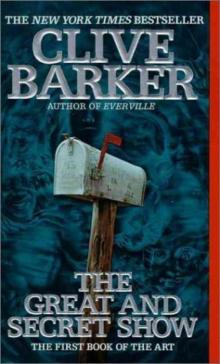 The Great and Secret Show
The Great and Secret Show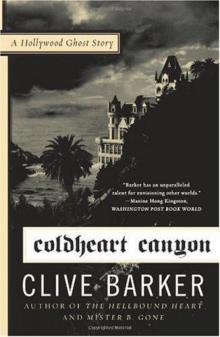 Coldheart Canyon: A Hollywood Ghost Story
Coldheart Canyon: A Hollywood Ghost Story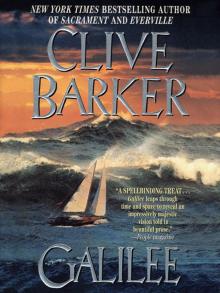 Galilee
Galilee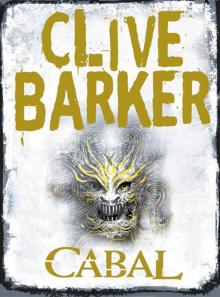 Cabal
Cabal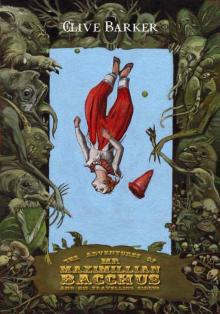 The Adventures of Mr. Maximillian Bacchus and His Travelling Circus
The Adventures of Mr. Maximillian Bacchus and His Travelling Circus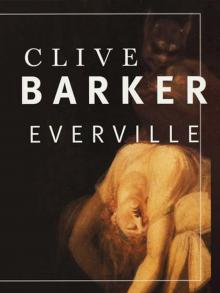 Everville
Everville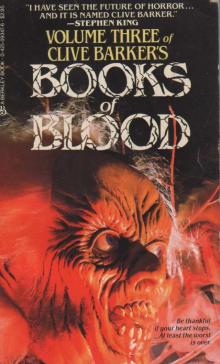 Books of Blood: Volume Three
Books of Blood: Volume Three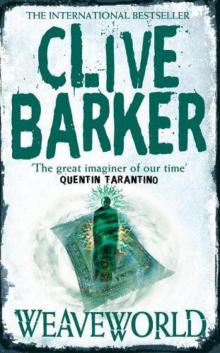 Weaveworld
Weaveworld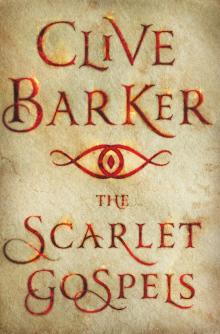 The Scarlet Gospels
The Scarlet Gospels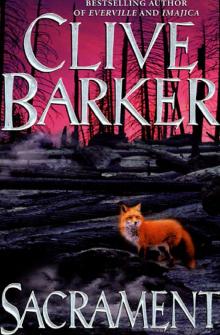 Sacrament
Sacrament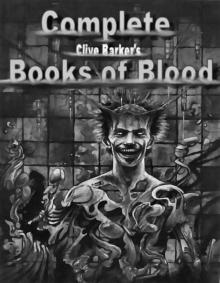 Books of Blood: Volumes 1-6
Books of Blood: Volumes 1-6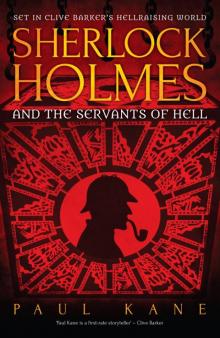 Sherlock Holmes and the Servants of Hell
Sherlock Holmes and the Servants of Hell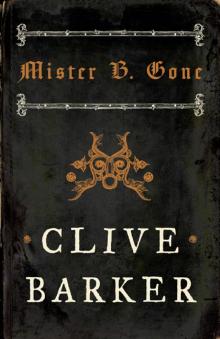 Mister B. Gone
Mister B. Gone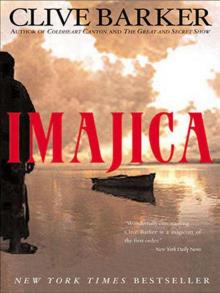 Imajica
Imajica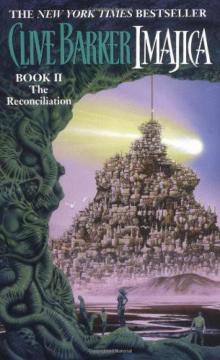 The Reconciliation
The Reconciliation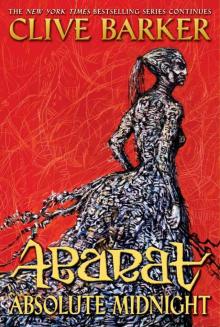 Abarat
Abarat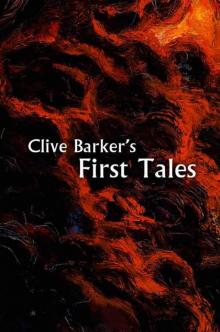 Clive Barker's First Tales
Clive Barker's First Tales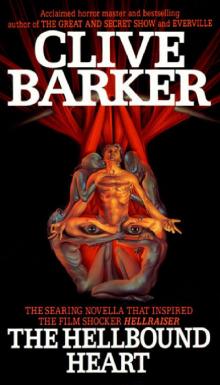 The Hellbound Heart
The Hellbound Heart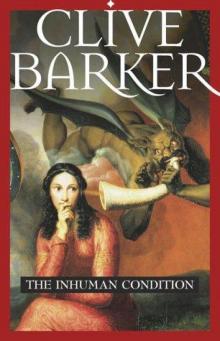 The Inhuman Condition
The Inhuman Condition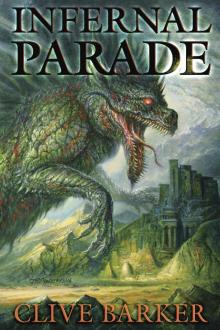 Infernal Parade
Infernal Parade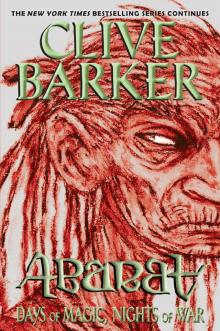 Days of Magic, Nights of War
Days of Magic, Nights of War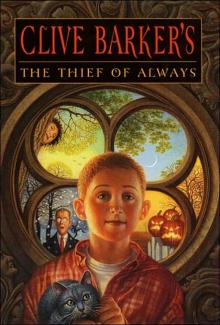 The Thief of Always
The Thief of Always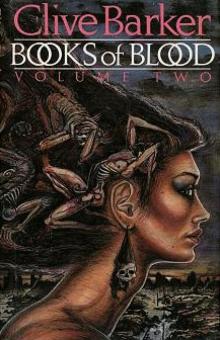 Books of Blood Vol 2
Books of Blood Vol 2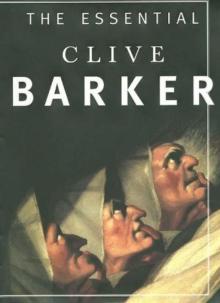 The Essential Clive Barker
The Essential Clive Barker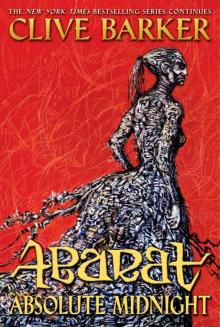 Abarat: Absolute Midnight a-3
Abarat: Absolute Midnight a-3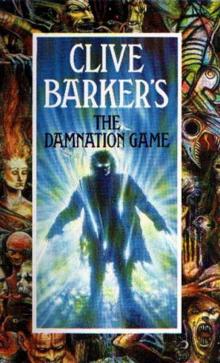 The Damnation Game
The Damnation Game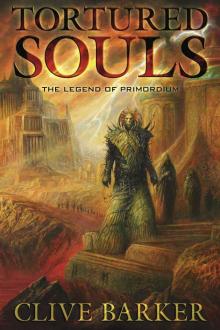 Tortured Souls: The Legend of Primordium
Tortured Souls: The Legend of Primordium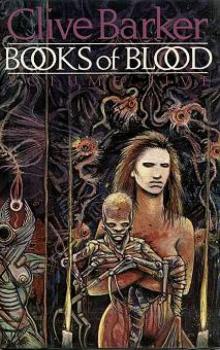 Books of Blood Vol 5
Books of Blood Vol 5 Imajica 02 - The Reconciliator
Imajica 02 - The Reconciliator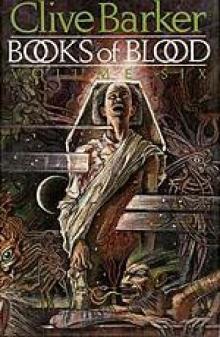 Books Of Blood Vol 6
Books Of Blood Vol 6 Imajica 01 - The Fifth Dominion
Imajica 01 - The Fifth Dominion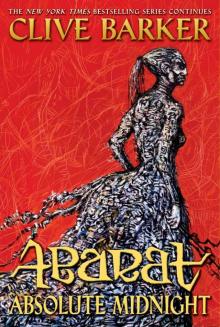 Abarat: Absolute Midnight
Abarat: Absolute Midnight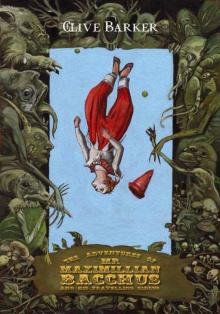 The Adventures of Mr. Maximillian Bacchus & His Traveling Circus
The Adventures of Mr. Maximillian Bacchus & His Traveling Circus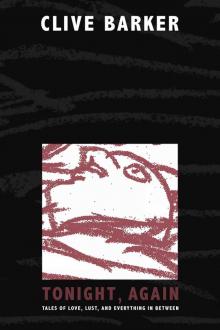 Tonight, Again
Tonight, Again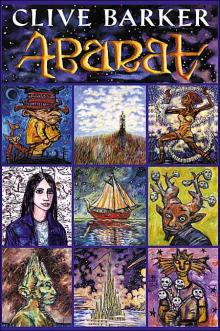 Abarat: The First Book of Hours a-1
Abarat: The First Book of Hours a-1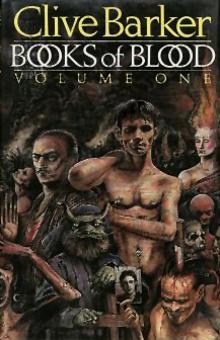 Books Of Blood Vol 1
Books Of Blood Vol 1 Age of Desire
Age of Desire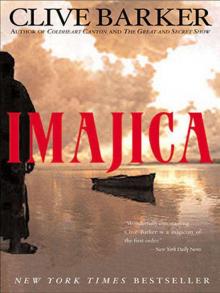 Imajica: Annotated Edition
Imajica: Annotated Edition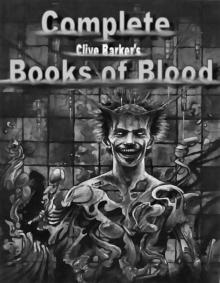 Complete Books of Blood
Complete Books of Blood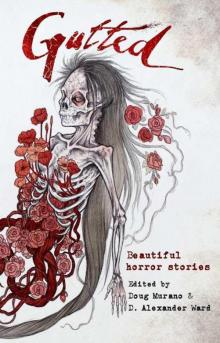 Gutted: Beautiful Horror Stories
Gutted: Beautiful Horror Stories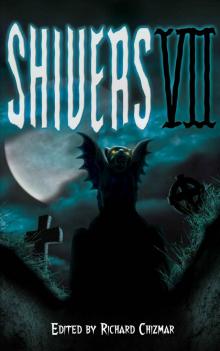 Shivers 7
Shivers 7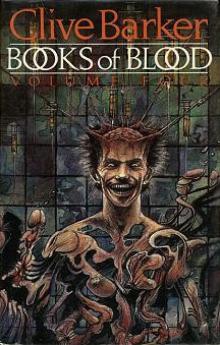 Books Of Blood Vol 4
Books Of Blood Vol 4